|
|
|
Sort Order |
|
|
|
Items / Page
|
|
|
|
|
|
|
| Srl | Item |
| 1 |
ID:
178603
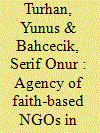

|
|
|
|
|
| Summary/Abstract |
While Turkish faith-based NGOs have been involved in delivering humanitarian aid for two decades, the relations of these organizations with the state have not received adequate scholarly attention. The main purpose of this article is to address this gap by asking what roles NGOs play in Turkey's humanitarian aid policy and practice. Despite the relative isolation of Turkey's administrative structure as a result of a strong state tradition, this paper shows that NGOs attempt to play political roles in Turkish foreign policy. The study relies on an analytical framework derived from constructivism to examine the agenda-setting and information-providing activities of Turkish NGOs between 2004 and 2016. Based on findings from a series of semi-structured interviews with 25 respondents from nine different NGOs and three state institutions, this artilce expands the research agenda on Turkey's foreign aid and shows that NGOs function as knowledge-providers, powerful catalysts for humanitarian aid activities, and influential voices in bringing humanitarian issues to light.
|
|
|
|
|
|
|
|
|
|
|
|
|
|
|
|
| 2 |
ID:
147693
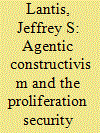

|
|
|
|
|
| Summary/Abstract |
Recent developments in global politics and international relations theory have raised questions about the strength of international norms. Critical constructivists identify instances of norm change, contestation, and even regress, arguing that norms may be less deeply internalized and more fragile than often assumed. This study builds on contemporary constructivist scholarship to advance a model of elite-driven norm change with stages of redefinition and substitution through contestation. It conducts a plausibility probe of the model by analyzing the development of the Proliferation Security Initiative, the US-led program that appeared designed to change normative principles from non-proliferation to counter-proliferation and from freedom of navigation on the high seas to maritime interdiction of suspect weapons and technology shipments. The model lends valuable insights on the evolution of norms to accommodate new realities over the last decade, and it suggests the need for more contingent and multi-linear theories of international cooperation.
|
|
|
|
|
|
|
|
|
|
|
|
|
|
|
|
| 3 |
ID:
149421
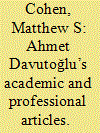

|
|
|
|
|
| Summary/Abstract |
International relations theories have sometimes been criticized as being focused on a narrow set of ideas and values. This article provides a means by which this problem can be addressed by examining the theories of former Turkish Prime Minister Ahmet Davutoğlu, who, prior to joining the government, was an international relations scholar. The article argues that gaining a greater understanding of Davutoğlu’s academic and professional publications is valuable not only to scholars interested in studying Turkey, but also to the study of international relations. Distinguishing him from other thinkers, Davutoğlu’s models are a combination of Islamic values, civilizational theories, and constructivism.
|
|
|
|
|
|
|
|
|
|
|
|
|
|
|
|
| 4 |
ID:
154742
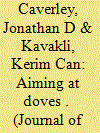

|
|
|
|
|
| Summary/Abstract |
Politicians (and journalists covering them) assume that association with the military has political consequences. We propose and experimentally test conditions under which military images have such effects. We presented subjects with images of the US president before varying backgrounds—including soldiers, students, children, and “ordinary” people. Only the image of soldiers has any significant effect, shifting participant preferences toward spending money on defense over education. The image does this by increasing respondent sense of threats to national security, despite the military’s depiction out of combat and in the background. The soldiers image does little to shift opinion about the president. However, the image has the largest hawkish effect on both the president’s copartisans and the strongest supporters. Given the routine use by many democracies of tactics unlikely to produce images of one’s fellow citizens in combat, the power of more sanitized images to cue hawkish policy preferences requires increased attention.
|
|
|
|
|
|
|
|
|
|
|
|
|
|
|
|
| 5 |
ID:
120352
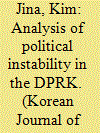

|
|
|
| 6 |
ID:
165317
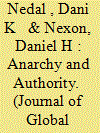

|
|
|
|
|
| Summary/Abstract |
Do international systems tend to remain anarchic because of recurring balances of power, or do they tend toward imbalances and hierarchy? Leading structural theories posit competing predictions about systemic outcomes, and the historical record offers evidence to support both claims. This suggests the need to theorize conditions under which one tendency or another is likely to dominate and what factors lead systems to transition from one state to another. We draw on constructivist and English School insights about international authority and legitimacy to develop such a framework. We conceive of patterns of international authority as structures independent from, and interacting with, mechanisms usually associated with international anarchy, such as the balance of power. We propose that international authority systems vary along two dimensions: particularist cosmopolitan and substitutable nonsubstitutable. Both are emergent properties of ideas and institutions located at the unit level. We argue that certain authority systems—particularist and nonsubstitutable—reinforce, and are reinforced by, anarchy and balanced distributions of capabilities. Others—cosmopolitan substitutable—facilitate rollup and domination and are likely to emerge or be maintained in hierarchic and highly asymmetric systems. By offering a structural account of international authority, we hope to contribute to the global turn in international relations, offering a framework for comparing systems across time and space. We also aim to help make sense of contemporary struggles over norms and values, their structural causes and consequences, and their potential implications for the future of global power politics.
|
|
|
|
|
|
|
|
|
|
|
|
|
|
|
|
| 7 |
ID:
105948
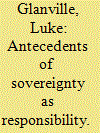

|
|
|
|
|
| Publication |
2011.
|
| Summary/Abstract |
Notions of 'sovereignty as responsibility' and 'the responsibility to protect' are often fra-med as radical departures from the 'traditional' conception of sovereignty. Many assume that sovereignty has, until recently, entailed only rights and not responsibilities. In con-trast, this article argues that sovereign authority has been understood to involve varied and evolving responsibilities since it was first articulated in the 16th and 17th centuries. It then traces the historical emergence of the tension between the right of sovereign states to be self-governing and free from outside interference and their responsibility to secure the safety of their populations. It cautions against a simplified story of 'traditional' sovereignty which reifies supposedly concrete and ahistorical rights of sovereigns while casting sovereign responsibilities as a morally abstract and late-arriving challenge.
|
|
|
|
|
|
|
|
|
|
|
|
|
|
|
|
| 8 |
ID:
112785
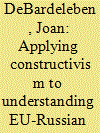

|
|
|
|
|
| Publication |
2012.
|
| Summary/Abstract |
The improved relations between Russia and the European Union (EU) in the 1990s were followed by a rise in tension since 1999. This article argues that constructivism can provide important insights into the basis of continuing difficulties. Drawing on the nature of the two actors, the author argues that the foreign policy identities of both actors are in a formative process, and thus the construction of inter-subjective meanings has the potential to be a particularly transformative element in the relationship. Both the Russian Federation and the EU are relatively new as regional and global actors, and both are in the process of forming their foreign policy identities, although in quite different contexts. Neither the EU nor Russia has developed a strategic conception for the relationship, and political discourse often obstructs communication rather than furthering the generation of inter-subjective meanings. The article argues that a constructivist analysis can help to expose the deep interconnections between normative disagreements, conflicting constructions of interests and differing concepts of governance.
|
|
|
|
|
|
|
|
|
|
|
|
|
|
|
|
| 9 |
ID:
101380
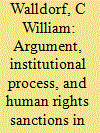

|
|
|
|
|
| Publication |
2010.
|
| Summary/Abstract |
When do humanitarian norms lead great powers, especially democracies, to impose sanctions against strategic partners and allies? I argue that answering more specific questions like this in space and time requires constructivists to focus greater attention on institutional and ideational process. Agents are central to policy change. But the ideational and institutional context in which agents build arguments determines when this change is more or less likely. In this vein, I argue that three factors in liberal states - legislatures, the nature of activist pressure, and strategic ideas - explain when humanitarian norms produce sanctions. I demonstrate the argument through a study of US Cold War relations with South Africa, Turkey, and Greece. Among other contributions, this article demonstrates how attention to process can extend the constructivist agenda into a series of new empirical domains and open avenues for contributions to important policy debates.
|
|
|
|
|
|
|
|
|
|
|
|
|
|
|
|
| 10 |
ID:
125125
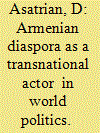

|
|
|
|
|
| Publication |
2013.
|
| Summary/Abstract |
IT IS CUSTOMARY to recognize sovereign states and the interstate organizations established on their basis as the leading actors in the political system of the contemporary world. Such theoretical schools as realism and, with some differences, constructivism support this approach.
|
|
|
|
|
|
|
|
|
|
|
|
|
|
|
|
| 11 |
ID:
119485


|
|
|
|
|
| Publication |
2013.
|
| Summary/Abstract |
ASEAN's engagement with human rights is characterized by an action-identity gap; member states have created impressive regional commitments while continually violating rights domestically. This gap suggests that member states of ASEAN have used rights for political ends, the enhancement of ASEAN's legitimacy in the eyes of critics, not because they are understood as morally correct. The strategic use of norms indicates that existing recourse to constructivist accounts of norms in ASEAN, currently the dominant explanatory framework, is incorrect. This article argues that an alternative, rational choice, framework for appraising norms within ASEAN offers greater explanatory insight into how and why human rights emerged into ASEAN after 1997. This argument suggests a revised approach to understanding norm violation within ASEAN and through that a more accurate appraisal of the nature of contemporary ASEAN.
|
|
|
|
|
|
|
|
|
|
|
|
|
|
|
|
| 12 |
ID:
087564
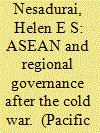

|
|
|
|
|
| Publication |
2009.
|
| Summary/Abstract |
This paper first reviews and critiques the dominant realist and constructivist accounts of ASEAN, which have enjoyed much prominence in The Pacific Review since the journal's founding in 1988. ASEAN behaviour and outcomes cannot be fitted into neat theoretical categories that emphasize either material or ideational variables in explanation. Instead, ASEAN displays complexities in behaviour that are the product of the contingent interaction between the material (power, territory, wealth) and the ideational (norms, ideas, identity) as member states actively seek to manage domestic order as well as regional order within and beyond ASEAN. In all of this, state interests and identities remain paramount, which means that the long-standing ASEAN norms of sovereignty/non-interference remain central to regional governance.
|
|
|
|
|
|
|
|
|
|
|
|
|
|
|
|
| 13 |
ID:
128739


|
|
|
|
|
| Publication |
2014.
|
| Summary/Abstract |
In this article I view Asian alliances as a product of universal security needs and culturally constructed variables. While the alliance remains one of the fundamentals of contemporary international politics, I attempt to show through comparative analysis of the Sino-Soviet alliance and the Japan-US security alliance how subtle differences of national developmental experience can significantly affect political outcomes in East Asia.
|
|
|
|
|
|
|
|
|
|
|
|
|
|
|
|
| 14 |
ID:
112875
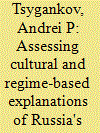

|
|
|
|
|
| Publication |
2012.
|
| Summary/Abstract |
Scholars disagree on how to interpret Russia's assertive foreign policy. According to some observers, Russia's authoritarian culture and political system have historically required the Kremlin to depend on the Western threat image at home and to engage in revisionist behaviour abroad. These observers recommend that Western nations abstain from engaging Russia as an equal contributor to shaping the global system. This article assesses the validity of the authoritarian expansionism theory by comparing it to other prominent perspectives on foreign policy, realism and constructivism. The article argues that, by perceiving Russia's historical and institutional distinctness as fundamentally threatening to the West, the theory overlooks important sources of foreign policy contestation at home and potentially varying directions abroad. The article selects the historically important cases of the Crimean War, the Cold War and the Russia-Georgia War to demonstrate the theory's flaws and to highlight the role of factors other than Russia's authoritarianism in the nation's foreign policy.
|
|
|
|
|
|
|
|
|
|
|
|
|
|
|
|
| 15 |
ID:
147380
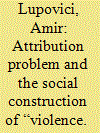

|
|
|
|
|
| Summary/Abstract |
Many scholars suggest that the difficulty of attaining cyber deterrence is due to the intrinsic characteristics of cyberspace. While this article does not aim to entirely refute this assertion, it suggests that the failure to successfully employ cyber deterrence is not determined by the technical challenges of cyberspace, but rather that the effects of these challenges are mediated through social context(s) and norms. To present this, I elaborate on the meaning of cyber deterrence and suggest that a rethinking of this term allows us to better address the various actors involved in the practices of cyber deterrence, as well as to better describe the intersections between the cyber and kinetic means affecting these practices. Building on the concept of cyber deterrence and borrowing from the constructivist approach to International Relations, I focus on how anonymity and “violence” are affected by social constructions and norms and in turn influence the success or failure of cyber deterrence. I briefly illustrate these assertions and their importance with regard to the case of Stuxnet.
|
|
|
|
|
|
|
|
|
|
|
|
|
|
|
|
| 16 |
ID:
160117
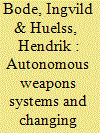

|
|
|
|
|
| Summary/Abstract |
Autonomous weapons systems (AWS) are emerging as key technologies of future warfare. So far, academic debate concentrates on the legal-ethical implications of AWS but these do not capture how AWS may shape norms through defining diverging standards of appropriateness in practice. In discussing AWS, the article formulates two critiques on constructivist models of norm emergence: first, constructivist approaches privilege the deliberative over the practical emergence of norms; and second, they overemphasise fundamental norms rather than also accounting for procedural norms, which we introduce in this article. Elaborating on these critiques allows us to respond to a significant gap in research: we examine how standards of procedural appropriateness emerging in the development and usage of AWS often contradict fundamental norms and public legitimacy expectations. Normative content may therefore be shaped procedurally, challenging conventional understandings of how norms are constructed and considered as relevant in International Relations. In this, we outline the contours of a research programme on the relationship of norms and AWS, arguing that AWS can have fundamental normative consequences by setting novel standards of appropriate action in international security policy.
|
|
|
|
|
|
|
|
|
|
|
|
|
|
|
|
| 17 |
ID:
132355
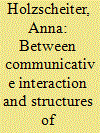

|
|
|
|
|
| Publication |
2014.
|
| Summary/Abstract |
This paper discusses contemporary engagement with the theory and analysis of discourse in international relations. It argues that discourse understood as "meaning in use" has emerged as one of the core concepts in constructivist scholarship, being of tremendous theoretical and analytical value. The paper identifies two distinct types of discourse analysis around which most contributions in this field converge: micro-interactional approaches that emphasize the communicative, pragmatic aspects of discourse and macro-structural approaches focusing on discourse as structures of signification. What unites these studies is their interest in the diffuse power relationships that characterize social interaction in international politics and the productive effects of power that the term "discourse" serves to underline. Through a combination of these two different strands of discourse research, with two different conceptualizations of power (deliberative and productive), the paper develops a taxonomy of discourse approaches that reflects four distinct variants of discourse research. These variants are illustrated by means of an in-depth discussion of recent innovative studies. In conclusion, the paper points to a number of limitations in the present conceptualization of power through discourse as well as in terms of the uneasy combination of positivist epistemology and constructivist ontology in much empirical discourse research. Discussing the overlap between discourse and practice scholarship, the paper sketches future directions for research in this field.
|
|
|
|
|
|
|
|
|
|
|
|
|
|
|
|
| 18 |
ID:
109466
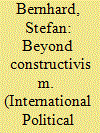

|
|
|
|
|
| Publication |
2011.
|
| Summary/Abstract |
This article applies a political sociology of knowledge to an EU social policy field. Taking the case of poverty and social inclusion policy, it shows that European social policy has found a raison d'être alongside national social policies, feeding into EU member states' national policies and producing comparative policy-relevant knowledge based on a genuine set of resources. Going beyond constructivist approaches, this article contends that the establishment of these resources can be reconstructed productively as the establishment of a transnational field in Pierre Bourdieu's sense of the term. In a process stretching over more than four decades, the EU's rudimentary policy for tackling poverty in the 1970s has evolved into a semi-autonomous field of social inclusion policy. This field encompasses monitoring capital, social capital, officializing capital, scientific capital, and informational capital, all of which EU-level actors use in different ways to position themselves against other actors in this transnational field. Thus, a complex and dynamic configuration arises that consists of actors, institutions, and ideas. The article concludes that while there are many affinities between constructivism and political sociology, the latter can go further in analyzing and theorizing phenomena such as ideas and discourses.
|
|
|
|
|
|
|
|
|
|
|
|
|
|
|
|
| 19 |
ID:
190058


|
|
|
|
|
| Summary/Abstract |
Literature on European security and defence cooperation usually asserts that differences in national security interests and security cultures prevent agreement beyond the “lowest common denominator”. I propose that it is possible for states to agree on mutually binding commitments also in this policy field. Using Nordic security and defence cooperation as a case study, I examine what characterises their mutual commitments and how we might account for them. The article adds to the literature on European security and defence cooperation by suggesting that binding commitments in security and defence would not have come about in the Nordic context without a sense of “Nordic togetherness”. This conclusion is important because it demonstrates that a shared sense of identity and norms is significant for understanding how security and defence cooperation between states is possible.
|
|
|
|
|
|
|
|
|
|
|
|
|
|
|
|
| 20 |
ID:
146455
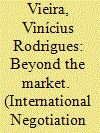

|
|
|
|
|
| Summary/Abstract |
Negotiators expect the World Trade Organization (WTO) to be an arena for states to pursue their material gain. However, the WTO also reflects symbolic aspects of international politics, in particular the notion of multilateralism. Although such a principle, in part, expresses Western dominance, Global South states have also benefited from multilateral regimes, and thus have incentives to legitimize them and behave according to their rules. Will the pattern of multilateralism change as other trade arrangements potentially gain more prominence? This article analyzes actions taken by Brazil and India in WTO’s Doha Development Agenda (DDA) and concludes that the multilateral system of trade will survive as Global South states participate in the organization to seek not just material gains but also to commit themselves to the international normative dimension.
|
|
|
|
|
|
|
|
|
|
|
|
|
|
|
|
|
|
|
|
|